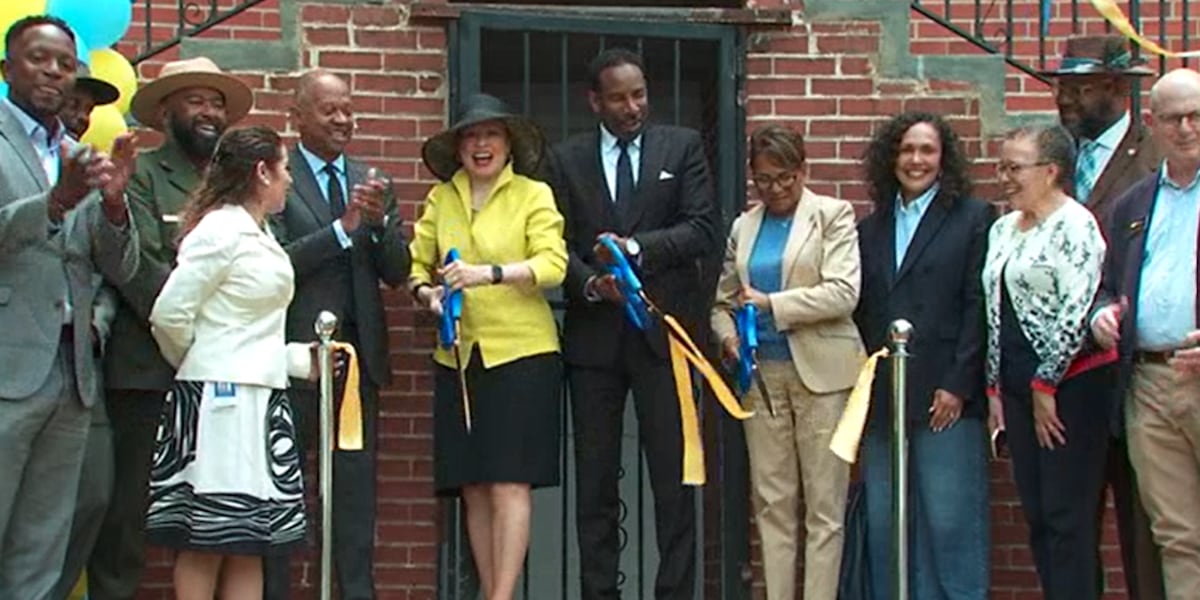Mika Wheeler Clabo cried out for help the morning of July 25, 2022, while struggling to keep his head above the waters of the Tennessee River in Knoxville, a lawsuit alleges. For 13 minutes, he gasped and groaned as he tried to pull himself out of the water or free himself from the vines that had ensnared him.
Tennessee
A man drowned as Tennessee police watched for 13 minutes, lawsuit says

No one helped Clabo — not the four police officers who watched him struggle from a few feet away, not the two EMTs who were on the riverbank before his head went under, and not the restaurant employees and diners who pleaded with officers to help, or at least to let them try, the suit alleges.
A year later, his mother is suing the city of Knoxville, its police chief and the four officers, accusing them of violating her son’s civil rights in a case of wrongful death. In a 32-page lawsuit filed Tuesday in the U.S. District Court for the Eastern District of Tennessee, Kimberly Williams-Clabo alleges that the public employees contributed to her son’s drowning by not only refusing to make any serious attempt to rescue him but also by warning private citizens not to do so.
“Mika deserved better than what he got … from people who were supposed to be first responders,” her lawyer, Lance Baker, told The Washington Post. “The first responders were essentially bystanders looking on.”
The city of Knoxville and its police department declined to comment on Williams-Clabo’s lawsuit.
In the days before July 25, 2022, Clabo, a 30-year-old master arborist, “lost everything” he had worked for over the previous two years: his new car, his self-esteem and his sobriety, the lawsuit says. As a teenager, Clabo became addicted to opioids and later turned to heroin to feed an addiction that led him to be incarcerated multiple times, the suit says.
But he eventually became clean and “began the long, hard road to recovery,” according to the suit. He excelled in a court-sponsored rehabilitation program. He moved into a halfway house in Knoxville and got a job at a salvage yard, where his boss described him as a “hard-worker, always early … never refused overtime.”
But in the days leading up to his death, Clabo relapsed, the suit states.
On July 21, his mother reported to Knoxville police that he was missing.
Then, around 10 a.m. on July 25, witnesses saw him being kicked out of a car in downtown Knoxville wearing only underwear and a T-shirt, according to the suit. Dozens of people called 911 to report him “acting erratically” and looking like he was “running away from something.”
A Knoxville officer in a cruiser spotted Clabo walking on nearby railroad tracks, the suit states. Then, he watched him jump a fence and run across a parking lot toward a restaurant that sits above the Tennessee River.
The officer approached Clabo, asking him, “What’s going on over here?” Clabo walked away slowly.
“Hey, whatcha doin?” the officer asked him, according to the lawsuit, which cites body-camera footage.
UPDATE: A body has been found and recovered by Knox County Rescue personnel. The investigation is ongoing at this time. https://t.co/8xjaOWRnzw
— Knoxville Police TN (@Knoxville_PD) July 25, 2022
Clabo bolted toward the water as the officer called out for him to “come on back when you’re done.” Seconds later, at 10:14 a.m., Clabo fell over the brushy riverbank and tumbled into the murky waters of the Tennessee. The officer called for the Knoxville Fire Department to send a rescue boat.
Then, the officer allegedly asked Clabo to get out of the water, repeatedly told him to swim and then ordered him to make his way over to the dock. At 10:17, the officer told a restaurant employee that he couldn’t reach Clabo and scoffed at the notion of Clabo’s drowning, the suit states. Then, the officer allegedly told Clabo to relax and “hang out down there, dude” until the rescue boat arrived.
A second officer arrived at 10:21 and, after spotting Clabo, said “he’s not going anywhere,” according to the suit. A third got to the scene shortly after that and merely watched what was happening, right around the time Clabo was shouting and gasping in the water, the suit alleges.
The officers “acted with no urgency whatsoever throughout the incident to respond to the life-or-death situation,” according to the suit.
Clabo continued to struggle. At 10:25, as the first officer and a restaurant employee walked around the dock with a clear view of Clabo, the employee told the officer “that tree’s wrapped around his neck,” the suit states. A minute later, one of the other officers allegedly radioed dispatch to tell firefighters that they didn’t think Clabo would cooperate with directives to swim or grab hold of something. Seconds later, Clabo gasped loudly, a sound captured on one of the officer’s body-camera videos.
At 10:27, his head disappeared under the water.
Twenty-two seconds later, an officer can be heard on body-cam video saying, “Yeah, he went under,” the suit states.
Standing on the dock with his arm resting on a pole, the officer who first saw Clabo said, “What do we do?” according to the lawsuit.
At 10:30, the rescue boat arrived.
About two hours later, divers found Clabo’s body close to where he had fallen in — near the water’s edge, according to the suit. He was ensnared in vines, his head mere inches below the surface of water that was about 5 or 6 feet deep, it alleges
Knox County medical examiners determined that Clabo’s death was an accidental drowning, the suit states.
But Baker, the family’s attorney, said that Clabo might have lived if officers or EMTs had done something or allowed private citizens to help.
“If he had received actual trained first responders instead of bystanders,” the lawyer added, “the result may have been different.”

Tennessee
BBB warns of online romance scams as West Tennessee women fall victim – WBBJ TV

JACKSON, Tenn. — Over the past three weeks, West Tennessee women have fallen victim to online romance scams, losing thousands of dollars to who they thought was their new found love.
Scammers stole a reported nearly $50,000 from two local women, just over the last month. That’s according to the Better Business Bureau, and recent reports from women — one as close as Hardeman County — who said they have been scammed out of nearly $24,000 each from an online love interest.
Both victims said the men they were talking to online told them they were in the military, claiming they couldn’t access their bank accounts due to being out of the country.
The BBB of the Mid-South says scammers often use “hard luck stories” to manipulate people into sending money.
“This is how the money becomes involved, so before moving on to asking you for money, the scammer may say, ‘Oh, I’m having some financial troubles. My heat may be getting cut off,’” said Toddnetta Trice, Communication Specialist for the BBB of the Mid-South.
Experts warn that many scammers steal photos from other social media accounts and pretend it is them. You can do a reverse image lookup using many sites like Google to see if the images are stolen from someone else.
Also, be wary of those who talk about the importance of trust. Experts say this will often be the first step to asking you for money.
“Unfortunately when it comes to the money aspect, a lot of the times that’s a lose-lose,” Trice said. “There is no way of getting your money back, but you definitely want to report it. You can always report it to our BBB Scam Tracker.”
The Scam Tracker is a free tool anyone can use to report scammers. Click here for more.
If you have lost more than $40,000 due to fraud, report it to the FBI’s Internet Crime Complaint Center, another avenue for reporting online crimes. Click here for more.
For more local news, click here.
Tennessee
Elizabeth Hurley and Billy Ray Cyrus cozy up on ‘Tennessee weekend’ after debuting romance

No more achy breaky heart.
Elizabeth Hurley and Billy Ray Cyrus looked very cozy on a ranch in new photos posted Sunday after going public with their romance.
The couple was seen smiling and cuddling up against a tree, while another shot showed them sitting in an off-road vehicle next to a black-and-white dog.
Hurley captioned the post, “Tennessee weekend ❤️.”
The pair hard-launched their relationship last week on Easter Sunday with a picture of Cyrus, 63, giving the actress a kiss on the cheek.
Days later, Hurley, 59, shared a video of the two riding off into the sunset on the ranch.
A source told Page Six that Cyrus and Hurley’s romance is “very new.”
“They’ve been friends for a long time and both found themselves single at the same time,” the insider said, admitting it was surprising they went public so soon.
“The romantic side started only a few weeks ago.”
Meanwhile, Hurley’s close friends, including Elton John, are said to be confused by her attraction to Cyrus.
“Liz’s friends think it must be a joke or madness, but they aren’t saying it to her,” a knowledgeable source told us.
“Elton may not understand this relationship, and is a bit bemused by it. But for all his faults, Elton is really loyal to Liz.”
However, an insider close to the “Austin Powers” star claims Cyrus is exactly who she’s been looking for.
“She’s been waiting a long time for romance,” a pal told Page Six, confirming Hurley traveled to the “Hannah Montana” alum’s Nashville property.
“I think she likes the whole cowboy thing.”
Tennessee
Quick Takes: Tennessee responds in a big way with a 9-3 win over LSU

Tennessee bounced back in fine fashion Saturday night as the Vols used a 6 run 8th inning to pull away from LSU for a 9-3 win to set up the rubber game in the series Sunday afternoon. Here’s four quick takes an what feels like an important win for the Vols as May arrives next week.
Tennessee’s response I — It was only natural to wonder how Tennessee would respond following the Friday night/Saturday morning 9th inning collapse. It was just out of character for the Vols. You had to go a ways to find a collapse like that in the Tony Vitello era. So how would the Vols respond.
The answer — the way you are supposed to. Tennessee no hit LSU through the first four innings and the Vols jumped out to a 3-0 lead.
Tony Vitello said early in the year, his question about this team is how would they respond to adversity. They haven’t been perfect this season, but they have been ok. They haven’t had more adversity to overcome than they had coming to the ball yard Saturday night and Tennessee responded exactly the way a championship program should.
Tennessee’s response II — Leading 3-0, Tennessee found themselves where they were on Friday and back to back LSU home runs got the Tigers back into the game 3-2 heading into the top of the 8th.
Tennessee had left 11 on base heading into the 8th frame. The Vols couldn’t get that key hit to have a big inning.
How would the Vols respond to getting punched in the mouth in the bottom of the 7th and the crowd back into the game? Tennessee responded with 6 runs.
The Vols took advantage of LSU hitting two, an intentional walk. Hunter Ensley picked up an RBI by getting plunked. Dalton Bargo brought in two on a single and Cannon Peebles put things on ice with a three blast to left field.
Marcus Phillips was brilliant minus two pitches — Tennessee had lost three straight game two’s in SEC play heading into Saturday night. The Vols had bee outscored 21-9 in those three games.
In a must have performance to give the Vols a chance to win the game and the series, Marcus Phillips delivered in a big time way. Phillips made two bad pitches out of 100. Phillips no hit the Tigers through the first four frames. He finished going 6.2 innings giving up 2 home runs and 3 total hits. Phillips had 6 strikeouts and gave up 4 walks.
Phillips worked himself out of a big jam in the fifth. LSU had first and third with one out. Phillips got a fly out to shallow right and made a great play on a bunt attempt getting the out at first to get out of the jam.
Have a day Cannon Peebles — Eric Cain wrote a good piece on Peebles and his improvement as a hitter as the switch hitting catcher has moved into the every day role behind the plate.
Peebles improved calm demeanor has showed up the last couple of weeks and it showed up in a big way Saturday night. Peeples went 2 for 3 at the plate and recorded 5 RBI’s with a base hit a three run home run and a sacrifice fly.
Peebles has 4 multi hit games in the Vols last seven outings. He’s 11 for his last 26 (.423) with 13 RBI’s and 5 HR’s.
-
News1 week ago
Harvard would be smart to follow Hillsdale’s playbook. Trump should avoid Biden’s. | Opinion
-

 Politics7 days ago
Politics7 days agoVideo: Hegseth Attacks the Media Amid New Signal Controversy
-

 Culture5 days ago
Culture5 days agoNew Poetry Books That Lean Into Calm and Joy Amid Life’s Chaos
-

 News1 week ago
News1 week agoMaps: Where Do Federal Employees Work in America?
-

 Technology1 week ago
Technology1 week agoPete Hegseth reportedly spilled Yemen attack details in another Signal chat
-

 Politics1 week ago
Politics1 week agoPope Francis and US presidents: A look back at his legacy with the nation's leaders
-

 World7 days ago
World7 days agoNew Zealand’s minor gov’t party pushes to define women by biological sex
-

 Politics1 week ago
Politics1 week agoJD Vance has ‘exchange of opinions’ on issues like deportations during meeting with top Vatican official













